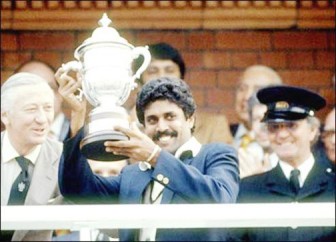By Nils Campbell
The moment of devastation had to be faced. It was the moment when the West Indies lost to India in the final of the 1983 World Cup competition.
The West Indians were on a high having won the two previous competitions and had failed to ignore the signs which included a defeat to India in the preliminary competition.
The lofty West Indians basking in the superiority of their fearsome pace attack seemed to be thinking that the title was already in the bag.
So as was the case of their tour of New Zealnd, they could not truthfully claim that were beaten by 13 men, and not by 11 players.
This was not the case of two teams being considered
as equals as happened when the West Indies had faced an Australian attack with Dennis Lillee and Jeff Thompson who made it really hard for West
Indies batsmem and with the umpires signalling out when the signal should be not out, or vice versa
This time the fight for the Prudential Cup was against India pure and simple a team under new skipper Kapil Dev that just seemed to want it more and who did not seem intimidated by the West Indian fast bowling arsenal.

The shock of losing to India is understandable if one dares take a look back at the two World Cup finals prior to 1983.
In the first one against Australia, the West Indies had a wash of batsmen.
Yet, in all of this, only three of the batsmen made any sort of representation and they were Clive Lloyd and his 102, Rohan Kanhai with 56, and Keith Boyce’s 34.
Of course, for courtesy sake, we may add Bernard Julian’s 26.
In the second World Cup final it was Richards’ 138, and Collis King with his 86 that was the backbone of the team’s batting.
How merciful was Desmond Haynes input of 20 to that innings.
Lloyd, who in the first final had taken the game by the scruff of its neck, to borrow Richard’s words, only contributed an unlucky 13.
In the third World Cup final, even against India, The West Indies needed more than two batsmen to score runs even though the bowlers had dismissed India out for a mere 183.
Richards conceded:”Things had changed a bit by the by the time the third World Cup came around in 1983 but we still approached the contest not just as champions, but as champions who fully expected to retain our crown.”
He added:”We knew we were still the best one-day team in the World and perhaps, importantly, our supporters knew it as well.
“They were united in the belief that the World Cup was ours by right and I think most of our team believed that,” he had stated.
Richards was cognizant of the fact that India had beaten the West Indies in the preliminary rounds of the competition.
“Even though India had beaten us in the first match, we thought our confidence had returned after we had beaten the Australians and Pakistan and having to face the Indian team once again,” was his assessment of the situation.
But, by the time the West Indians had occupied the crease a different tale had begun to unfold.
The Indians were most determined to win the World Cup. Sunil Gavaskar, who was relieved of the captaincy was freely involved in setting the field – a setting that proved disastrous for Larry Gomes and Faoud Bacchus who both reached outside their off-stumps and were given out subsequently.
New captain, Dev, and others and others, accepted Gavaskar’s field placings and again, this ssmed to help a great deal in India winning the World Cup
In fairness to Richards throughout his regrets over the loss of the 1983 final, he never once mentioned that Lloyd’s early entry had any negative effect on his batting or on his concentration in the match against India.
It was the belief of some of his supporters in Guyana that his early departure had to do with Lloyd’s early entry.
It was also widely believed that the reason why Lloyd, with his painful groin, came to the wicket was to give support to Richards because the `Super Cat’ had felt uneasy with the batsmen at the other end. One other point that must be noted is that Richards could not help to praise the Indian board for its generosity in rewarding the Indian players for winning the game.
The West Indies Cricket Board (WICB) had never seen any wisdom in upping the rewards for West Indian players for winning two World Cup in succession.
In addition to monetary awards, the Indian board offered apartments to the Indian players and talks of cars were seemingly enough of incentives to make the Indian players, wanting to win more.









